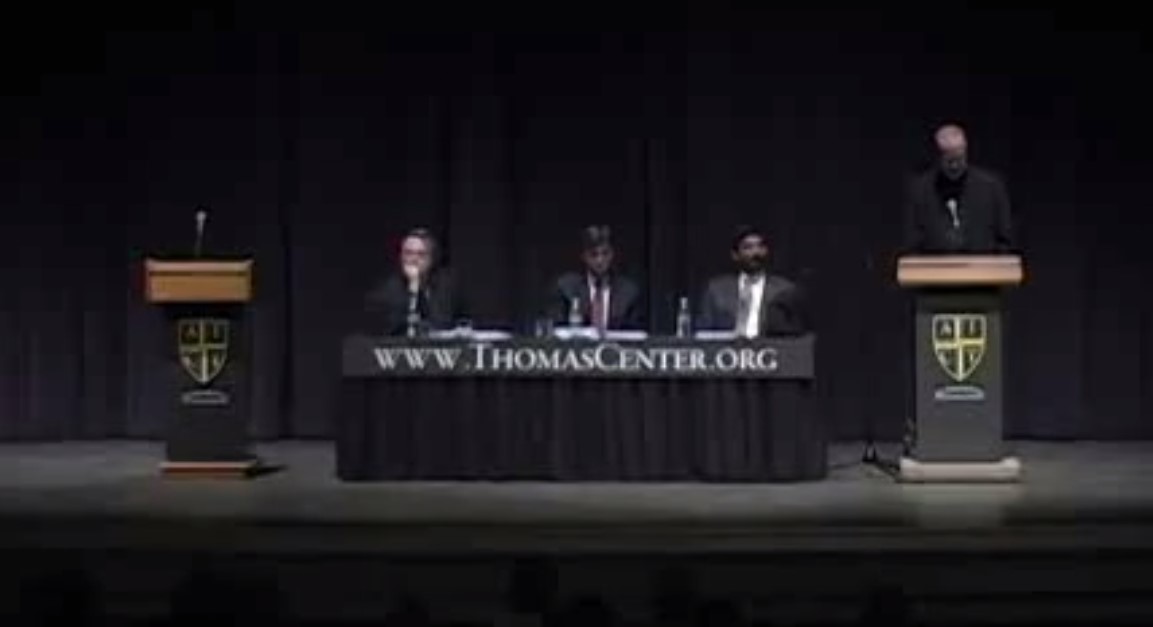CONTINUED:
D’SOUZA: Hitchens was a very tricky guy to debate because you couldn’t debate him in the normal way.
I remember watching a debate. I think it was between Hitchens and William Lane Craig, the very capable Christian apologist. Craig would outline the five reasons for this and the four reasons for that, and Hitchens would not address those but would rely on slingshots and jibes and guffaws, and he did it all in the Oxford style, you know: “Mr. President, Mr. Chairman, may I interject” and so on.
I realized that he was having such a jovial time of it that if I were in the audience, if I were a student watching these two men and I were to ask the question, not who has the better argument, but which guy would I like to meet after this debate for a drink or for dinner? The choice would go overwhelmingly to Hitchens, and I realized from that that debate is ultimately not merely an intellectual exchange because ultimately when someone is watching—a Christian debate an atheist—they’re asking themselves, would I rather be a Christian or an atheist? Would I rather be more like Dinesh or would I rather be more like Hitchens?
So Hitchens’s arguments were in that sort of bohemian mode. This is the type of thing. He would say, “Well, Dinesh, I just got back from North Korea. I’ve met God. His name is Kim Jong-il. He’s a lot like your God. But to be honest, I would much rather live under Kim Jong-il than I would under your God because at some point Kim Jong-il will die and the tyranny will come to an end. But Dinesh, in your scheme, it last forever. Your God is a far worse tyrant than Kim Jong-il.”
Now this is not intended as an argument. But it’s kind of whimsical. It’s witty. It tells the audience that Hitchens is a man about town. He’s cosmopolitan. He just got back from North Korea. He’s speaking from experience. He’s expressing this kind of bold revolt against anyone tyrannizing over him in any way. This is a kind of radical expression of freedom.
And so I always I had to think to myself now. How do you refute that? What do you say in response to that? And so with Hitchens, it was always a matter—not merely meeting the argument but ultimately speaking a language that was itself, you may say, Hitchensian, that engaged him at his own level and in his own terms, and flustered him on his own terms. And he would definitely be flustered that way.
So I’ll give you what I think is one of my best arguments, where I literally could see him look very disconcerted. Later to me, he goes, “I’m gonna have to go back to the drawing board on that one.” He was invoking the Freudian argument that religion is wishful thinking. This comes from Freud’s book on religion The Future of an Illusion. The idea here is very simple that Christians cannot bear the actual sufferings of life. They get diabetes. They get old. They get sick, and because they cannot cope with suffering in the world, they manufacture in their mind another world called heaven, which liberates them from having to face the world as it is.
So this you can see is a very Hitchensian. It’s sort of Hitchens striking the pose of bravery. He’s morally tough and facing the world as it is. We Christians are sort of living in the sort of la-la land. And he loved this kind of argument.
My rebuttal to it was: “Well, Hitchens, there appears to be a grain of truth in what you say. And if it were true the Christians wanted to live in a sort of better world than the one we actually inhabit, I can totally see why Christianity and other religions too fabricate the idea of heaven because heaven is much better than anything that we face in this life. Heaven is no suffering, no hardship, no pain. But you have to admit that Christianity like Judaism and Islam also has another concept, which is much harder to square with this Freudian analysis. And that is the idea of hell. Now hell is a lot worse than diabetes. It’s a lot worse than suffering. It’s a lot worse than the ordinary pains of life. And in fact, it’s eternal. So why would a group of people looking to fabricate this kind of happy? Is to avoid facing the hardships of life come up with something that is actually far worse than anything that life has to offer. Why would they do that?”
And Hitchens could not answer. I think he had never thought of it. It hit him straight between the eyes, and he realized I’ve got to come up with a theory that doesn’t merely account for heaven but also accounts for hell, and so we had a lot of this going on back and forth. Sometimes he would say things, and I would go “Wow, I have to think of a better way to come back on that one.”
I think one of my best points against Hitchens had to do life after death. Hitchens said in effect, “You know, Dinesh is an intelligent man. And normally he lives his life by rational calculations. If somebody were to tell Dinesh, you know, your wife is cheating on you. Dinesh would say well what’s the evidence? So he lives his life by the normal rules of empirical inquiry he goes, but when it comes to Christianity, Dinesh throws his brains out the window and so Dinesh will say things like I believe in life after death. And Hitchens goes that’s ridiculous. Has Dinesh been to the other side of the curtain? Has he seen what comes after death? Does he have one ounce of empirical evidence that there’s life after death. Of course not. So he’s talking complete nonsense. Ultimately, what he’s saying is a statement of pure faith based upon no evidence whatsoever.”
And in my rebuttal, I said to Hitchens: Well, you have explained my belief in life after death as purely the product of faith. So let me ask you do you believe there’s life after death?
He goes, “No.”
I said, “Oh, well, have you been to the other side of the curtain? Have you seen what comes after that?
“No.
“In other words, what information do you have that I don’t about what comes after. None. So the real difference between you and me is not that you know and I don’t know, that you’re using evidence and I’m not. The truth of it is, we’re both making a leap of faith. We both are asserting a belief in something for which neither of us can provide any definitive empirical evidence. The real difference between you and me is not that you know and I don’t or that I know and you don’t. It is that I will openly and honestly admit that my position is based on faith. Whereas you poor deluded atheists somehow think that your position is based on evidence, even though in fact you have none.”
So this is just to give a feeling of what those debates sounded like we did about 10 of them. Frankly, I don’t think we did a single one in a church. We did one in the museum of St. Louis. We did one at the University of Colorado in Boulder. We did several on campuses, and so they were debates in front of a secular audience and that made them particularly engaging and challenging and fun.



